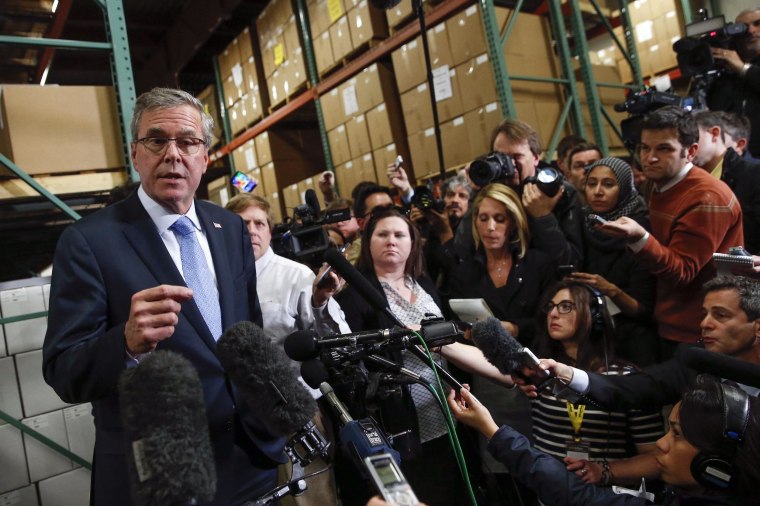“Let Jeb be Jeb,” one of the former Florida governor’s top advisers told the New York Times back in December, describing a mantra of Jeb Bush’s 2016 campaign.
That's a campaign promise that Jeb Bush appears to be keeping so far. In a radio interview with conservative host Sean Hannity on Tuesday, Bush backtracked slightly from his suggestion earlier this week that he would have opted to authorize the invasion of Iraq if he were president. Bush clarified his remarks after strong criticism from Democrats and even fellow Republicans.
But the original remark and his strong defense of his brother’s decisions, even on Iraq, fit in with the ethos of Bush’s campaign: Jeb Bush is simply determined to run for president his way and not bow to political customs unless he absolutely must. It's a combination of principle and stubbornness that could be his undoing, or a key to his success.
Bush is being loyal to his brother and father, even if it means defending the unpopular Iraq War and regularly praising on the campaign trail the tenure of George H.W. Bush, whom many conservative Republicans dislike. In a Fox News interview that aired on Monday night, Bush said, “of course I’m going to ask my brother his advice,” praising George W. Bush’s foreign policy knowledge.
He will not commit to opposing any tax increases as president, even though all of the other major GOP candidates are making that pledge.
He's consistently voiced his support for the Common Core education standards, frequent standardized testing for schoolchildren, an increase in legal immigration and the creation of a pathway to legalization for undocumented immigrants, even though all four views are opposed by many conservatives.
When key conservative groups hosts events, most of the other candidates show up. Not Bush. He’s skipped forums in Iowa and South Carolina sponsored by Citizens United, the influential conservative group, that nearly all of the other GOP candidates attended.
Bush meets personally with influential evangelical leaders, but declines the multi-candidate forums they host.
“Do you want people to just bend with the wind, to mirror people’s sentiment whoever is in front of you? ‘Oh, yes, I used to be for that but now, I’m for this.’ Is that the way we want to elect presidents?” he told Fox.
Bush's answers to these questions is a strong no.
His approach is a marked contrast to typical campaign maneuvering by White House hopefuls. In 2008, both Hillary Clinton and Barack Obama expressed concerns about legalizing same-sex marriage and creating more free-trade agreements between the U.S. and other nations, comments that seemed insincere at the time and both have since reversed. Mitt Romney changed a number of his views on the way to winning the GOP nomination in 2012, and Wisconsin Gov. Scott Walker has distanced himself from his previous support of a path to citizenship for illegal immigrants in the midst of this campaign.
Candidates are often accused of flip-flopping and putting politics over principle, but it's the approach successful politicians most often take. In his 2000 presidential run, John McCain dubbed his campaign bus “The Straight Talk Express” and was known for his blunt, candid comments. He lost to George W. Bush.
McCain ran eight years later, renounced his support for immigration reform, aligned himself with GOP leaders on other issues and won the party’s nomination.
Jeb Bush is not apolitical or averse to using some aggressive tactics like traditional candidates. He’s raising huge amounts of money and stretching the bounds of campaign finance law with an array of super PACs created to support his campaign. Despite his reputation as a moderate, Bush is a mainstream conservative on most issues, backing limits on abortion rights, a smaller federal government and tax cuts to spur economic growth, just as the other Republican 2016 candidates do.
But his independent streak is notable and potentially problematic. In Walker and Florida Sen. Marco Rubio, Republicans have two major candidates who are considered mainstream and able to win a general election, like Bush, but who will also follow party orthodoxy rather than seeking to change it. The Republican Party has drifted away from supporting a path to legalization for undocumented immigrants, but Bush is fighting that shift, instead of accepting it as Rubio and Walker have.
Bush is appealing to Republicans in part because of the perception that he can win a general election against Clinton, and because of his ties to the Latino community and the state of Florida. But a smart, winning candidate, as some Republicans noted this week, is not one who is defending the Iraq War, even if his brother started it.
New Jersey Gov. Chris Christie, trailing Bush in the GOP primary process right now, quickly seized the opportunity to tweak his rival, telling CNN, “ If we knew then what we knew now, and if I were president of the United States, we wouldn't have gone to war.”
“Jeb's statement is likely to resonate until he either changes his position or loses the race for the Republican nomination. Should he become the nominee, the issue will dog him into the general election campaign,” Byron York of the conservative Washington Examiner wrote before Bush spoke to Hannity.
In his comments to Hannity, Bush suggested he had misunderstood the initial question on Iraq, which the former governor interpreted as if he would have authorized the Iraq invasion with the same faulty intelligence his brother had. But even on a second try, Bush went out of his way to praise George W. Bush’s leadership.
"In the last few years of my brother’s presidency, the surge was quite effective," Bush said.
